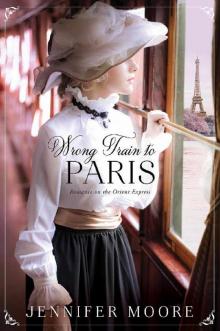- Home
- Jennifer Moore
Lady Helen Finds Her Song Page 3
Lady Helen Finds Her Song Read online
Page 3
Michael could have taken his meals with the officers at the Bengal Club, but he didn’t want to endure the other men’s inquiries after his health—or worse, their pity. Perhaps I am just getting old and set in my ways. He grimaced and shook his head. Thirty-two was hardly old. His men respected him, and the other officers were friendly enough, but he was not like them. He did not consider his time in India merely as an assignment to be endured. He’d told General Stackhouse the truth. India was his home. And since the death of his parents, the army was the only family he had left.
The feeling of loneliness returned. Basu Ram and Naveen cared for him, especially Basu Ram. Michael knew the old man loved him like a son, but it did not matter how dear they were to each other; the Indians would never accept him as one of their own. They would never sit at his table and share his food. If he joined them, they would not eat in his presence. And if he ate from their plates, they would break the dishes afterward to prevent anyone else from eating on them and becoming unclean. As low as servants were in the Indian caste system, Michael was ferengi, a foreigner, an outcaste, and as such he was even lower.
He had grown up with the cultural divisions and never questioned them until he returned from England and began to see how very different this world was from a British perspective. But even though he was a sahib, his attachment to the Indian people and way of life often made it difficult for him to see the British point of view. Sometimes he felt as if he did not fit into either role. Perhaps that was why he shared his meal with a monkey and afterward spent the evenings with two Indian servants, hunkering down on the ground outside to discuss religion or politics or gossip from the bazaar.
With 180 native languages, fourteen major tongues, and seven hundred minor dialects in India, Michael’s fluency in Hindustani, Bengali, and Punjabi was a small drop in the bucket, but it was the reason General Spencer had offered him the adjutant position. His ability to speak with the natives and to understand their ways is what had kept him from being sent home to early retirement on half pay.
And where was “home” anyway?
Against his will, his mind returned to Lady Helen. Was she happy in her new home? The mansion assigned to the general in Chowringhee was one of the more beautiful residences in the city, but as a lady, the daughter of an earl or marquess, she had likely grown up in an English manor house or even a castle. Surely it was an adjustment, and India could be frightening to British miss-sahibs who found themselves surrounded with insects and heat and a culture that was so very foreign. Although the British threw dinner parties and picnics and tried to maintain as “English” a routine as possible, India was not England. As he’d watched Lady Helen make her way through the crowded docks, he’d seen nervousness in her eyes, but there had also been interest and an excitement that he’d not seen in any of the British women. He hoped she found the country beautiful and fascinating the way he did.
But he told himself it was too much to hope for. Not one young British woman of his acquaintance had ever enjoyed her time in India. They had complained of everything from the heat to the smells to the insects, and most returned with their children to India long before their husbands’ military service was completed. He’d thought there was something different in Lady Helen. The way she’d played with Badmash for example—he could not imagine many ladies allowing the monkey to kiss their hand without recoiling. Michael smiled again as he thought of the incident, and he hoped he could hear her laugh again. That was a sound he did not think he would ever tire of.
Between working closely with her stepfather and Michael’s position in society as an officer, he would undoubtedly spend a fair amount of time in Lady Helen’s presence. His heart constricted as he found himself looking forward to seeing her again and at the same time dreading another meeting. His interest would all come to naught, and he did not know how he could smile and make polite conversation with the woman when he knew she would never— It was impossible.
Michael rose from the table but did not go outside. He didn’t want to make excuses for the change that Basu Ram had seen in him. He knew he could not hide the truth from one who knew him so well. Even with all of his training and discipline, he feared he could not prevent himself from losing his heart to Lady Helen.
Chapter 3
Helen looked down at her plate, pushing around the bits of spicy chicken and rice with her fork. The food tasted strange, but it was not unpleasant. She set down her fork and lifted her hand to cover a yawn. Although her body was exhausted, her mind buzzed with all the newness surrounding her.
She and her mother had spent the majority of the day in the sitting room, speaking with the head servant—a man in white clothing and a multilayered turban, whose name neither of them could pronounce—and the housekeeper, or hamal, as they learned she preferred to be called.
Although her mother had said Helen’s presence during matters of business was unnecessary, Helen insisted on remaining. Not only did she want to aid her mother in sorting through the household organization, but she also found the entire Indian system of labor and the rules that governed it to be fascinating.
Both Helen and Lady Patricia had been utterly overwhelmed by the amount of people in their new home. The number of servants was well over fifty, and the pair had gone over lists for hours, learning which people bore which responsibilities. It seemed as though there were multiple people for each duty, but the hamal had explained in her careful English that because of their castes, the servants were confined in the labor they were able to perform. For example, two servants were required for each horse—one to groom the animal and the other to prepare its food. Another was responsible for cleaning the stables. The water carrier brought water to the door, but another person was required to deliver the large jars to the kitchen.
Helen wondered about the castes. Was it the same as class division in England? She didn’t find it strange that certain people performed particular duties, but the idea that they were forbidden to perform other, seemingly similar tasks confused her. She wished there was someone she could ask about it. Perhaps Jim could explain it to her.
As a servant cleared the plates, the room was quiet save for the creaking of the punkah—a large wooden frame covered in fabric that hung from the high ceiling of the room—swinging back and forth to stir the air. Apparently the household employed a servant, a punkawallah, whose entire job consisted of pulling the cord that ran down the wall in order to keep the contraption moving. She glanced at her stepfather at the head of the table and thought it was the perfect opportunity to ask him.
“Helen, dear.”
When she heard her mother’s voice, Helen turned her gaze to Lady Patricia. “Yes, Mamá?”
“Would you mind making me a cup of tea? I am feeling a bit under the weather.”
Helen looked closer and saw that her mother’s face was pale. The travel and long day must have taken their toll on her. “Of course, Mamá.”
Jim studied his wife with his one eye squinting. “Patricia?” He could not hide the worry in his voice.
“Pishposh, I am just fine.” She waved her hand at her husband then turned to Helen. “My herbs are in the sitting room next to my bedchamber in their usual box. If you don’t mind, I think peppermint and chamomile, dear.”
Helen hurried from the table and into the sitting room for the ingredients. Based on her mother’s request, Helen knew Lady Patricia must need to calm her stomach. When her mother was using tea for a medicinal purpose, she preferred for herself or her daughter to prepare it.
Helen found the herbs directly and brought them down the stairs but realized she had no idea where to find the kitchen. The servants had brought the food from the doorway that led to the drawing room, so she began her search in that direction. Once her mother had tea, Helen was eager to explore the rest of the house.
After walking through a few different rooms, she thought she must have gone too far. The kitchen must be closer to the dining room. She turned around and decided to
inquire of the servants that had brought the meal. The evening light shining through the windows was fading. Helen’s footsteps sounded on the bare floors and echoed off the high ceiling. She spotted a servant who was wiping a cloth over the furniture in the drawing room, and Helen waved a hand. “If you please?”
The servant turned, put her palms together, and bowed while Helen approached.
Helen tried to remember if she had come across this woman earlier. She didn’t think so. She would no doubt have recognized the dramatic pattern of the blue-and-green silk wrapped around her. The sari was beautiful, and Helen found it rather surprising that the servants wore such vividly colored clothing. “Would you please fetch me a teapot? Or tell me where I might find one?”
The woman raised her head and said something Helen did not understand. The servant motioned with her hand in the direction from which Helen had just come.
Helen glanced over her shoulder then back to the woman. She shook her head. “I’m sorry. I do not understand. Is that the direction to the kitchen?” She held up the bag of herbs and with her other hand pinched her fingers together and lifted them to her mouth in a charade of drinking from a teacup. She felt a bit foolish and hoped the servant would realize what she needed.
The woman spoke again, nodding and beckoning for her to follow. Helen followed her to a door beside a window, but the servant reached for the door handle.
“No, I do not want to go outside.” Helen nearly groaned in frustration. She had been searching for the kitchen for nearly twenty minutes. A simple thing. Is this how it would be every time she tried to communicate with the staff? “I simply need a teapot.”
The woman opened the door and stood aside. Helen let out her breath in an irritated puff that reminded her a bit too much of Fanny Cavendish. She humored the servant and stepped outside, meaning to turn directly back around and find another person to help her. But she stopped when she saw, in the dim light, a small wooden building behind the main house. She inhaled the aroma of spices and realized she had found the kitchen. Outside the building, a fire burned inside a small box of bricks that she decided must be an oven. A man sat on the ground next to it, wearing only a turban and a cloth around his hips. He was mixing some sort of dough in a bowl he held between his bare feet.
She looked back at the woman, who nodded toward the building and said more strange-sounding words, lifting her hand and pointing.
Helen crossed the space toward the open door and looked inside, expecting to see tables and ovens and shelves containing pots and dishes—perhaps even a cooling box for meat. So she was surprised to see people squatted down on the floor, washing out pots and using knives to chop things on boards between their feet. The only table was a small one upon which sat a bowl of fruit.
For a moment, Helen stared as she fought to swallow the sour tang that rose in her throat. The meal she had just eaten had been prepared by partially naked people on the floor of this small room. She wondered if her mother had any idea what the kitchen looked like and thought perhaps it would be best not to mention it.
A woman who seemed to be in charge hurried over, bowing her head.
She must be the head cook. Helen schooled her face, hoping for a pleasant expression as she attempted to keep her nose from wrinkling at the spicy smells in the air. “I need to boil some water, please.”
The servant who had accompanied her from the house spoke briefly. The cook glanced to the parcel in Helen’s hand and stepped toward a cupboard, opening the wooden door and lifting out a silver tea set.
“Yes,” Helen said, smiling in relief. “Thank you.” She thought she should probably learn the words the woman had used to ask for the teapot and avoid any confusion in the future.
Next, the cook pulled a brass kettle from the cupboard and called to a boy who brought a jar, carefully filled the kettle with water, then carried it to the fire outside.
Helen did not want to stand next to the practically bare man mixing the dough so remained in the kitchen doorway, watching the people.
She realized that there was a definite system to what they were doing. A feel of orderliness pervaded the room. In the few minutes that she watched, she saw each person tend to their duties unhurriedly, ensuring that they’d done a thorough job but not feeling as if they must rush. It was a characteristic she’d noticed about the various servants she’d met, a calmness that set her at ease.
The boy approached, bowing, and said something as he motioned toward the kettle. She followed him, thanking him as he poured the hot water into the silver pot and thinking again how much simpler it would be to communicate if she understood just a few words of their language. Perhaps Captain Rhodes could teach her. Did he not say he spoke the native languages?
Darkness had come quickly, and she was glad to return inside. But by the time she entered the dining room with the tea tray, she found only Jim.
“Your mother has already retired to her room.” Jim took the tray. “I will deliver the tea, and that woman’s knowledge and use of herbs should have her feeling well in no time.”
“Thank you, sir.” Helen wondered if she should go to her mother as well but decided against it. Lady Patricia was undoubtedly worn out from a long day of trying to organize a colonial Indian household, and sleep would do her well.
She bid Jim good night, but Helen was not ready for sleep herself. There was still so much of the house she hadn’t seen, and now that most of the servants were gone, she took the opportunity to explore the mansion. She recognized the rooms and what they were used for, but the arrangement was unlike that of an English home. Though the upper floor rooms branched off a hallway, she found it strange that the rooms on the main floor opened into one another. The ceilings were high and the beams bare. When she’d inquired about it, Jim had told her plastered ceilings were a hiding place for rats and snakes, and the earlier colonists had done away with them completely, adopting the Indian style.
Helen walked from room to room, holding a candle high to see the details of her new home. She stepped on thick, colorful rugs that spread over the wooden floors. Palm trees and flowering plants grew from large pots around the whitewashed walls. With the high ceilings and large rooms, the house seemed wide open, and in the darkness it was a bit unnerving. It definitely lacked the warmth and coziness she was accustomed to in an English house.
She studied the pictures and perused the shelves of books in the library. The majority of the furniture was bare and stark, and she noticed that many of the small windows did not have glass but carved screens that allowed light and air to flow in but kept large things out. The screens were not completely effective—moths and flying insects clustered around the small flames on the wall sconces. The fluttering was surprisingly noisy, and the movement cast strange shadows around the large room.
Helen felt a chill as the darkness seemed to change just outside her vision. She heard a noise that sounded like something scuttling along the wooden floor, and cringed. Perhaps she ought to retire and explore the house in the light of day.
Turning quickly to leave the room, she rounded the large desk and walked directly into the path of an enormous tiger!
Helen screamed and stumbled back, hitting her arm against the desk as she fell. She looked over her shoulder at the tiger as she scrambled to her feet.
It stood unmoving in the corner of the room, staring at her with black eyes flickering in the candlelight, its teeth bared in a snarl.
A surge of terror shot through her so strongly it hurt her fingers. How had it gotten in the house with nobody noticing?
The realization came suddenly that the animal hadn’t moved. It had not made a noise. Embarrassment replaced her panic. The tiger was stuffed.
In an instant, the room was filled with servants. Jim bounded into the library in his robe and slippers, brandishing a pistol, his eye patch askew. He looked around the room frantically, and when he spotted her, he ran toward her. “Helen, what is it?”
“The tiger, sir.” Her voi
ce shook. “It startled me. I did not realize . . .” Whether a product of embarrassment, abating fear, or the exhaustion from her long day, her voice cracked and tears welled in her eyes. She put her hand over her mouth and looked away from the confused faces of the servants. The entire household seemed to be in the library.
Jim ordered everyone to return to their duties and then helped Helen to a sofa. He sat next to her and patted her shoulder until she stopped shaking.
Though she felt foolish for her display, Jim’s presence soothed her.
“I am sorry, sir,” she said once she had control over her voice. “I feel completely ridiculous.”
“There is no need to apologize. You did exactly the right thing should you ever find yourself in danger. Did you see how quickly the household came to your rescue? You are safe here, Helen.”
She nodded, wiping her fingers over her cheeks.
“Now, are you injured?”
“I hit the desk but not badly.” She craned her neck to the side and rubbed her arm. “I think it is only my pride that is injured.”
Jim peered closely to inspect the reddening mark. “You may well have a bruise tomorrow, but I do not think it is serious.” He stood, offering his arm, and Helen slid her hand into the crease of his elbow.
Jim led her from the library, through the entry hall, then up the staircase. “I came face-to-face with a tiger in the jungle outside Nagpur, and I do not believe a moment in my life has ever come close to frightening me that badly since.” Jim cleared his throat. “Until tonight.”

 Charlotte's Promise
Charlotte's Promise Miss Leslie's Secret
Miss Leslie's Secret My Dearest Enemy
My Dearest Enemy A Week in Brighton (Timeless Regency Collection Book 13)
A Week in Brighton (Timeless Regency Collection Book 13) Solving Sophronia (The Blue Orchid Society, #1)
Solving Sophronia (The Blue Orchid Society, #1) Spring in Hyde Park
Spring in Hyde Park Emmeline
Emmeline Wrong Train to Paris (Romance on the Orient Express, #2)
Wrong Train to Paris (Romance on the Orient Express, #2) Wrong Train to Paris
Wrong Train to Paris Miss Burton Unmasks a Prince
Miss Burton Unmasks a Prince Safe Harbor
Safe Harbor The Sheik's Ruby
The Sheik's Ruby Change of Heart
Change of Heart Lady Helen Finds Her Song
Lady Helen Finds Her Song Simply Anna
Simply Anna